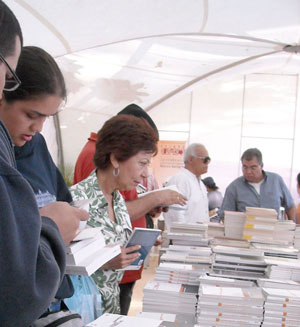

Vol. 72/No. 48 December 8, 2008

|
| Militant/Maggie Trowe |
| Readers browse through Librerías del Sur stand at Fourth Venezuela International Book Fair in Caracas. |
The large and popular stand of the government-run Librerías del Sur (Bookstores of the South), which feature titles by Venezuelan publishers, sold more than 35,000 books, according to bookstore president Pedro Pérez.
By the end of November 15, Pérez reported, sales by all the stands at the fair—more than 100—reflected a 50 percent increase from the previous year.
Publishers and book vendors in the fair came from Venezuela and several other Latin American countries, as well as Pathfinder Press in the United States, the only U.S. publisher participating.
As well as browsing the books in the stands, the thousands of visitors had a choice of dozens of panel presentations, poetry readings, and musical performances to choose from every day. There was no charge for entrance to the fair or the events.
Many visitors had received bono-libros—coupons worth $7 each on book purchases given by government departments to employees—to add to their buying power. At food and coffee stands and at the large fountain at the center of the park, people had meals and snacks while they talked or read books they had bought.
This year’s honored country, Ecuador, had a large stand with information about the country. Many programs and workshops featured Ecuadoran poets, writers, and musicians.
The fair’s three-day central forum was titled “Books in the Building of Bolivarian Socialism.” Moderators at these sessions included Venezuelan minister of culture Héctor Soto and his Ecuadoran counterpart, Galo Mora.
Renowned Cuban authors Nancy Morejón and Miguel Barnett read from their works in another presentation.
The political highlight of the fair was a meeting to launch Fidel Castro’s new book, La Paz en Colombia (Peace in Colombia). It attracted more than 500 people. In the book Castro draws the lessons of the Cuban Revolution on the need to take political power out of the hands of the capitalist class and challenges the prolonged guerrilla warfare strategy and hostage-taking tactics of the Revolutionary Armed Forces of Colombia (FARC). Speakers included Cuban minister of culture Abel Prieto and José Arbesú, the deputy head of the International Relations Department of the Central Committee of the Communist Party of Cuba.
A featured program at the fair was the three-day International Conference of Booksellers held at the Fine Arts Museum in the park. Some 80 people attended the opening session where the panel included Marisela Guevara, president of Venezuela’s National Book Center; Pedro Pérez; and Rosa Fernández, president of Distribuídora Venezolana, the government-run book distribution network.
A selection of the more than 100 people who run the 52 outlets of Librerías del Sur attended this booksellers conference. They came from as far as Puerto Ayacucho in Amazonas state. Several had spent a few months studying in Cuba in recent years. Also present were owners and managers of privately owned bookstores in Venezuela, Colombia, Mexico, Argentina, Uruguay, and the United States.
Casa del ALBA—a cultural project initiated by the Cuban and Venezuelan governments that promotes the publication and distribution of books and music in several countries in Latin America, Central America, and the Caribbean—set up a spacious tent with one side devoted to books and the other to hosting several programs every day. It was a pole of attraction at the fair. ALBA stands for the Bolivarian Alternative for the Americas.
A forum called “World Conjuncture: present … future?”—sponsored by Casa del ALBA—featured Venezuelan writer Luis Britto and U.S. Socialist Workers Party candidate for president in 2008, Róger Calero. Explaining that capitalism “is in a crisis of severe internal contradiction and anarchy of production,” Britto predicted that there will be some peaceful transitions to socialism, but that some will be attacked because the capitalists never give up power voluntarily. He said that in the new revolutionary epoch, “the new socialism will be based on ecology and austerity.”
Calero spoke about his experiences meeting fighting workers during the U.S. election campaign and participating in actions against the deportation of immigrants, and his conviction that socialist revolution in the United States is possible. Asked by one participant about what happened to the “American dream,” Calero replied that it never existed, recalling how Malcolm X spoke of the “American nightmare.” When the same person asked whether the election of Barack Obama would lead to socialism, Calero responded, “Imperialism’s stripes don’t change from one election to another.”
Many panels and presentations were sponsored by Monte Avila and El Perro y La Rana (The Dog and the Frog), two publishers that are part of the Venezuelan government’s ambitious book production operation.
Pathfinder Press joined Monte Avila in presenting a panel to launch the Monte Avila edition of Is Socialist Revolution in the U.S. Possible? by Mary-Alice Waters. Pathfinder also organized a presentation to launch issue number 8 of Nueva Internacional, which features the article “Revolution, Internationalism, and Socialism: The Last Year of Malcolm X.”
Front page (for this issue) |
Home |
Text-version home